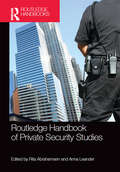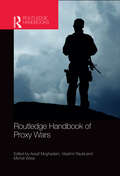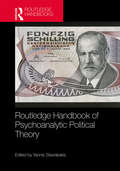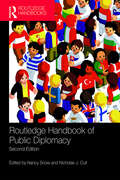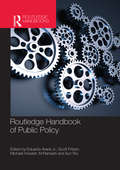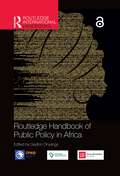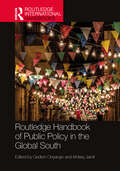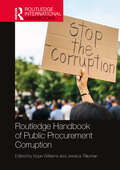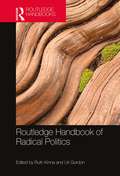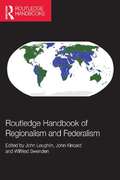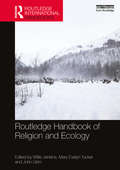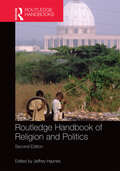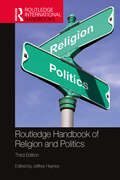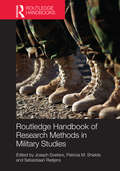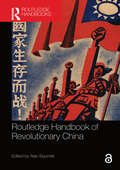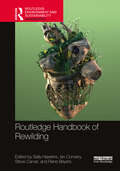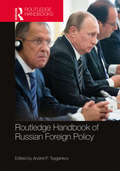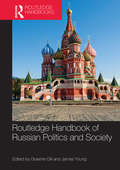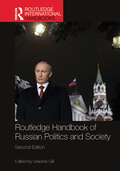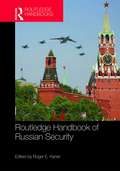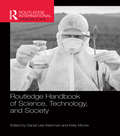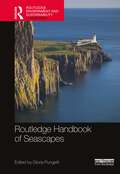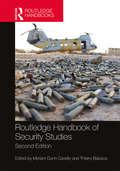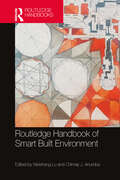- Table View
- List View
Routledge Handbook of Private Security Studies
by Rita Abrahamsen & Anna LeanderThis new Handbook offers a comprehensive overview of current research on private security and military companies, comprising essays by leading scholars from around the world. The increasing privatization of security across the globe has been the subject of much debate and controversy, inciting fears of private warfare and even the collapse of the state. This volume provides the first comprehensive overview of the range of issues raised by contemporary security privatization, offering both a survey of the numerous roles performed by private actors and an analysis of their implications and effects. Ranging from the mundane to the spectacular, from secretive intelligence gathering and neighbourhood surveillance to piracy control and warfare, this Handbook shows how private actors are involved in both domestic and international security provision and governance. It places this involvement in historical perspective, and demonstrates how the impact of security privatization goes well beyond the security field to influence diverse social, economic and political relationships and institutions. Finally, this volume analyses the evolving regulation of the global private security sector. Seeking to overcome the disciplinary boundaries that have plagued the study of private security, the Handbook promotes an interdisciplinary approach and contains contributions from a range of disciplines, including international relations, politics, criminology, law, sociology, geography and anthropology. This book will be of much interest to students of private security companies, global governance, military studies, security studies and IR in general.
Routledge Handbook of Proxy Wars
by Assaf Moghadam Vladimir Rauta Michel WyssThis Handbook is the first volume to comprehensively examine the challenges, intricacies, and dynamics of proxy wars, in their various facets. The volume aims to capture the significantly growing interest in the topic at a critical juncture when wars of many guises are becoming multifaceted proxy wars. Most often, proxy wars have wide-ranging implications for international security and are, therefore, a critically important subject of inquiry. The Handbook seeks to understand and explain proxy wars conceptually, theoretically, and empirically, with a focus on the numerous policy challenges and dilemmas they pose. To do so, it presents a multi- and interdisciplinary assessment of proxy wars focused on the causes, dynamics, and processes underpinning the phenomenon, across time and space and a multitude of actors throughout human history. The Handbook is divided into six thematic sections, as follows: Part I: Approaches to the Study of Proxy Wars Part II: Historical Perspectives on Proxy Wars Part III: Actors in Proxy Wars Part IV: Dynamics of Proxy Wars Part V: Case Studies of Proxy Wars Part VI: The Future of Proxy Wars By bringing together many leading scholars in a synthesis of expertise, this Handbook provides a unique and rigorous account of research into proxy war, which so far has been largely missing from the debate. This book will be of much interest to students of strategic studies, security studies, foreign policy, political violence, and International Relations.
Routledge Handbook of Psychoanalytic Political Theory
by Yannis StavrakakisThe emerging field of psychoanalytic political theory has now reached a stage in its development and rapid evolution that deserves to be registered, systematically defined, and critically evaluated. This handbook provides the first reference volume which showcases the current state of psychoanalytic political theory, maps the genealogy of its development, identifies its conceptual and methodological resources, and highlights its analytical innovations as well as its critical promise. The handbook consists of 35 chapters, offering original, comprehensive, and critical reviews of this field of study. The chapters are divided into five thematic sections: • The figures section discusses the work of major psychoanalytic theorists who have considerably influenced the development of psychoanalytic political theory. • The traditions section genealogically recounts and critically reassesses the many attempts throughout the 20th century of experimenting with the articulation between psychoanalysis and political theory in a consistent way. • The concepts section asks what are the concepts that psychoanalysis offers for appropriation by political theory. • The themes section presents concrete examples of how psychoanalytic political theory can be productively applied in the analysis of racism, gender, nationalism, consumerism, and so on. • The challenges/controversies section captures how psychoanalytic political theory can lead the way towards theoretical and analytical innovation in many disciplinary fields that deal with cutting-edge issues. The Routledge Handbook of Psychoanalytic Political Theory will serve as a scholarly reference volume for all students and researchers studying political theory, psychoanalysis, and the history of ideas.
Routledge Handbook of Psychoanalytic Political Theory
by Yannis StavrakakisThe emerging field of ‘psychoanalytic political theory’ has now reached a stage in its development and rapid evolution that deserves to be registered, systematically defined and critically evaluated. This Handbook provides the first reference volume which showcases the current state of psychoanalytic political theory, maps the genealogy of its development, identifies its conceptual and methodological resources and highlights its analytical innovations as well as its critical promise. The Handbook consists of 35 chapters offering original, comprehensive and critical reviews of this field of study. The chapters are divided into five thematic sections: Figures discusses the work of major psychoanalytic theorists who have influenced considerably the development of psychoanalytic political theory. Traditions genealogically recounts and critically reassesses the many attempts throughout the 20th century of experimenting with the articulation between psychoanalysis and political theory in a consistent way. Concepts asks what are the concepts that psychoanalysis offers for appropriation by political theory. Themes presents concrete examples of the ways in which psychoanalytic political theory can be productively applied in the analysis of racism, gender, nationalism, consumerism, etc. Challenges/Controversies captures the ways in which psychoanalytic political theory can lead the way towards theoretical and analytical innovation in many disciplinary fields dealing with cutting-edge issues. The Routledge Handbook of Psychoanalytic Political Theory will serve as scholarly reference volume for all students and researchers studying political theory, psychoanalysis, and the history of ideas.
Routledge Handbook of Public Diplomacy
by Nancy Snow; Nicholas J. CullThe second edition of the Routledge Handbook of Public Diplomacy, co-edited by two leading scholars in the international relations subfield of public diplomacy, includes 16 more chapters from the first. Ten years later, a new global landscape of public diplomacy has taken shape, with major programs in graduate-level public diplomacy studies worldwide. What separates this handbook from others is its legacy and continuity from the first edition. This first edition line-up was more military-focused than this edition, a nod to the work of Philip M. Taylor, to whom this updated edition is dedicated. This edition includes US content, but all case studies are outside the United States, not only to appeal to a global audience of scholars and practitioners, but also as a way of offering something fresher than the US/UK-centric competition. In Parts 1–4, original contributors are retained, many with revised editions, but new faces emerge. Parts 5 and 6 include 16 global case studies in public diplomacy, expanding the number of contributors by ten. The concluding part of the book includes chapters on digital and corporate public diplomacy, and a signature final chapter on the noosphere and noopolitik as they relate to public diplomacy. Designed for a broad audience, the Routledge Handbook of Public Diplomacy is encyclopedic in its range and depth of content, yet is written in an accessible style that will appeal to both undergraduate and postgraduate students.
Routledge Handbook of Public Policy
by Michael Howlett Xun Wu M Ramesh Eduardo Araral Scott FritzenThis Handbook provides a comprehensive global survey of the policy process. Written by an outstanding line up of distinguished scholars and practitioners, the Handbook covers all aspects of the policy process including: Theory – from rational choice to the new institutionalism Frameworks – network theory, advocacy coalition and development models Key stages in the process – Formulation, implementation and evaluation Agenda setting and decision making The roles of key actors and institutions This is an invaluable resource for all scholars, graduate students and practitioners in public policy and policy analysis.
Routledge Handbook of Public Policy in Africa (Routledge International Handbooks)
by Gedion OnyangoThis Handbook provides an authoritative and foundational disciplinary overview of African Public Policy and a comprehensive examination of the practicalities of policy analysis, policymaking processes, implementation, and administration in Africa today. The book assembles a multidisciplinary team of distinguished and upcoming Africanist scholars, practitioners, researchers and policy experts working inside and outside Africa to analyse the historical and emerging policy issues in 21st-century Africa. While mostly attentive to comparative public policy in Africa, this book attempts to address some of the following pertinent questions: • How can public policy be understood and taught in Africa? • How does policymaking occur in unstable political contexts, or in states under pressure? • Has the democratisation of governing systems improved policy processes in Africa? • How have recent transformations, such as technological proliferation in Africa, impacted public policy processes? • What are the underlying challenges and potential policy paths for Africa going forward? The contributions examine an interplay of prevailing institutional, political, structural challenges and opportunities for policy effectiveness to discern striking commonalities and trajectories across different African states. This is a valuable resource for practitioners, politicians, researchers, university students, and academics interested in studying and understanding how African countries are governed.
Routledge Handbook of Public Policy in the Global South (Routledge International Handbooks)
by Ishtiaq Jamil Gedion OnyangoThis important new handbook provides a comprehensive assessment of contemporary public policy and governance in the Global South. It offers incisive comparative analyses and presents policy-specific case studies from across Asia, Latin America, Middle East, and Africa. The aim is to inform future governance research, policy, and practice in these regions.This book is timely as it responds to how governments in the Global South are dealing with recent complex series of challenges and crises of the 21st Century. These range from the pressures of a global pandemic to the impacts of climate change, democratic backsliding, deteriorating public services, and the realignments in the international political economy following the rise of China. In doing so, it reflects on the political transformations, global convergences, and underlying regional, as well as national, trajectories that have taken place recently, focusing on among others: Democratic governance and institutional trust Public service delivery, motivation, and governance outcomes Policy crises, disaster management, and climate change Policy successes and failures Policy innovations, digitalisation, and policy research in the Global South Different authors bring together varied and specialised perspectives and experiences, which are important for researchers, practitioners, and policymakers wishing to understand emerging governance models, innovations, and challenges within the Global South.
Routledge Handbook of Public Procurement Corruption (Routledge International Handbooks)
by Sope Williams Jessica TillipmanThe Routledge Handbook of Public Procurement Corruption showcases the most innovative and exciting research being conducted in this important area of study, providing a comprehensive go-to reference for all who are interested in the topic.During the COVID-19 pandemic, the global race for health and ancillary goods amid global supply chain disruptions demonstrated that, when tested, all countries are incredibly vulnerable to fraud and corruption in public procurement, irrespective of their level of development. Yet despite the widespread nature of the problem, there remains a lack of in-depth, analytical, and cross-country investigations into public procurement corruption. This book addresses this gap by providing a comprehensive, multidisciplinary, geographically balanced treatise on corruption in public procurement. It combines country-specific studies to allow readers to easily compare differing perspectives and approaches and overarching thematic chapters to reflect on new and cutting-edge issues in procurement and their implications for procurement corruption. Key sectors such as healthcare and infrastructure are considered, as well as the role of new technologies, in both combatting and enabling procurement corruption.This Handbook provides academics, practitioners, and graduate researchers of public administration, law, and anti-corruption with all of the tools they need to understand the nuances of public procurement corruption around the world.
Routledge Handbook of Radical Politics
by Uri Gordon Ruth KinnaSuccessive waves of global protest since 1999 have encouraged leading contemporary political theorists to argue that politics has fundamentally changed in the last twenty years, with a new type of politics gaining momentum over elite, representative institutions. The new politics is frequently described as radical, but what does radicalism mean for the conduct of politics? Capturing the innovative practices of contemporary radicals, Routledge Handbook of Radical Politics brings together leading academics and campaigners to answer these questions and explore radicalism’s meaning to their practice. In the thirty-five chapters written for this collection, they collectively develop a picture of radicalism by investigating the intersections of activism and contemporary political theory. Across their experiences, the authors articulate radicalism’s critical politics and discuss how diverse movements support and sustain each other. Together, they provide a wide-ranging account of the tensions, overlaps and promise of radical politics, while utilising scholarly literatures on grassroots populism to present a novel analysis of the relationship between radicalism and populism. Routledge Handbook of Radical Politics serves as a key reference for students and scholars interested in the politics and ideas of contemporary activist movements.
Routledge Handbook of Regionalism & Federalism
by Wilfried Swenden John Kincaid John LoughlinAlmost all states are either federal or regionalized in some sense. It is difficult to find a state that is entirely unitary and the Routledge Handbook of Regionalism and Federalism necessarily takes in almost the entire world. Both federalism and regionalism have been subjects of a vast academic literature mainly from political science but sometimes also from history, economics, and geography. This cutting edge examination seeks to evaluate the two types of state organization from the perspective of political science producing a work that is analytical rather than simply descriptive. The Handbook presents some of the latest theoretical reflections on regionalism and federalism and then moves on to discuss cases of both regionalism and federalism in key countries chosen from the world’s macro-regions. Assembling this wide range of case studies allows the book to present a general picture of current trends in territorial governance. The final chapters then examine failed federations such as Czechoslovakia and examples of transnational regionalism - the EU, NAFTA and the African Union. Covering evolving forms of federalism and regionalism in all parts of the world and featuring a comprehensive range of case studies by leading international scholars this work will be an essential reference source for all students and scholars of international politics, comparative politics and international relations.
Routledge Handbook of Religion and Ecology (Routledge Environment and Sustainability Handbooks)
by Willis Jenkins, Mary Evelyn Tucker and John GrimThe moral values and interpretive systems of religions are crucially involved in how people imagine the challenges of sustainability and how societies mobilize to enhance ecosystem resilience and human well-being. The Routledge Handbook of Religion and Ecology provides the most comprehensive and authoritative overview of the field. It encourages both appreciative and critical angles regarding religious traditions, communities, attitude, and practices. It presents contrasting ways of thinking about "religion" and about "ecology" and about ways of connecting the two terms. Written by a team of leading international experts, the Handbook discusses dynamics of change within religious traditions as well as their roles in responding to global challenges such as climate change, water, conservation, food and population. It explores the interpretations of indigenous traditions regarding modern environmental problems drawing on such concepts as lifeway and indigenous knowledge. This volume uniquely intersects the field of religion and ecology with new directions within the humanities and the sciences. This interdisciplinary volume is an essential reference for scholars and students across the social sciences and humanities and for all those looking to understand the significance of religion in environmental studies and policy.
Routledge Handbook of Religion and Politics (Routledge International Handbooks)
by Jeffrey HaynesFrom the United States to the Middle East, Asia and Africa, religion continues to be an important factor in political activity and organisation. The second edition of this successful handbook provides the definitive global survey of the interaction of religion and politics. Featuring contributions from an international team of experts, it examines the political aspects of all the world's major religions, including such crucial contemporary issues as religious fundamentalism, terrorism, the 'war on terror', the 'clash of civilizations', the Arab Spring, and science and religion. Each chapter has been updated to reflect the latest developments and thinking in the field, and new chapters such as ‘Postsecularism and international relations’ and ‘Securitization and Secularization: The two pillars of state regulation of European Islam’ have been added to ensure the book is a comprehensive and up-to-date resource. Four main themes addressed include: World religions and politics Religion and governance Religion and international relations Religion, security and development References at the end of each chapter have been overhauled to guide the reader towards the most up-to-date information on various topics. This book is an indispensable source of information for students, academics and the wider public interested in the dynamic relationship between politics and religion.
Routledge Handbook of Religion and Politics (Routledge International Handbooks)
by Jeffrey HaynesThis third edition of the successful Routledge Handbook of Religion and Politics provides a definitive global survey of the interaction of religion and politics. From the United States to the Middle East, from Asia to Africa, and beyond, religion continues to be an important factor in political activity and organisation. Featuring contributions from an international team of experts, this volume examines the political aspects of the world's major religions, including crucial contemporary issues such as religion and climate change, religion and migration, and religion and war. Each chapter has been updated to reflect the latest developments and thinking in the field, and the handbook also includes new chapters on topics such as religious freedom, religion and populism, proselytizing, humanism and politics, and religious soft power. The four main themes addressed are: • World religions and politics • Religion and governance • Religion and international relations • Religion, security and development References at the end of each chapter guide the reader towards the most up-to-date information on these key topics. This book is an indispensable source of information for students, academics, and the wider public interested in the dynamic relationship between politics and religion.
Routledge Handbook of Research Methods in Military Studies
by Joseph Soeters Sebastiaan Rietjens Patricia M. ShieldsThis volume offers an overview of the methodologies of research in the field of military studies. As an institution relying on individuals and resources provided by society, the military has been studied by scholars from a wide range of disciplines: political science, sociology, history, psychology, anthropology, economics and administrative studies. The methodological approaches in these disciplines vary from computational modelling of conflicts and surveys of military performance, to the qualitative study of military stories from the battlefield and veterans experiences. Rapidly developing technological facilities (more powerful hardware, more sophisticated software, digitalization of documents and pictures) render the methodologies in use more dynamic than ever. The Routledge Handbook of Research Methods in Military Studies offers a comprehensive and dynamic overview of these developments as they emerge in the many approaches to military studies. The chapters in this Handbook are divided over four parts: starting research, qualitative methods, quantitative methods, and finalizing a study, and every chapter starts with the description of a well-published study illustrating the methodological issues that will be dealt with in that particular chapter. Hence, this Handbook not only provides methodological know-how, but also offers a useful overview of military studies from a variety of research perspectives. This Handbook will be of much interest to students of military studies, security and war studies, civil-military relations, military sociology, political science and research methods in general.
Routledge Handbook of Revolutionary China
by Alan BaumlerThe Routledge Handbook of Revolutionary China covers the evolution of Chinese society from the roots of the Republic of China in the early 1900s until the end of the Cultural Revolution in 1976.The chapters in this volume explain aspects of the process of revolution and how people adapted to the demands of the revolutionary situation. Exploring changes in political leadership, as well as transformation in culture, it compares the differences in experiences in urban and rural areas and contrasts rapid changes, such as the war with Japan and Communist ‘liberation’ with evolutionary developments, such as the gradual redefinition of public space. Taking a comprehensive approach, the themes covered include:• War, occupation and liberation• Religion and gender• Education, cities and travel.This is an essential resource for students and scholars of Modern China, Republican China, Revolutionary China and Chinese Politics.
Routledge Handbook of Rewilding (Routledge Environment and Sustainability Handbooks)
by Sally Hawkins Ian Convery Steve Carver Rene BeyersThis handbook provides a comprehensive overview of the history, theory, and current practices of rewilding. Rewilding offers a transformational paradigm shift in conservation thinking, and as such is increasingly of interest to academics, policymakers, and practitioners. However, as a rapidly emerging area of conservation, the term has often been defined and used in a variety of different ways (both temporally and spatially). There is, therefore, the need for a comprehensive assessment of this field, and the Routledge Handbook of Rewilding fills this lacuna. The handbook is organised into four sections to reflect key areas of rewilding theory, practice, and debate: the evolution of rewilding, theoretical and practical underpinnings, applications and impacts, and the ethics and philosophy of rewilding. Drawing on a range of international case studies the handbook addresses many of the key issues, including land acquisition and longer-term planning, transitioning from restoration (human-led, nature enabled) to rewilding (nature-led, human enabled), and the role of political and social transformational change. Led by an editorial team who have extensive experience researching and practising rewilding, this handbook is essential reading for students, academics and practitioners interested in rewilding, ecological restoration, natural resource management and conservation.
Routledge Handbook of Russian Foreign Policy
by Andrei P. TsygankovProviding a comprehensive overview of Russia’s foreign policy directions, this handbook brings together an international team of scholars to develop a complex treatment of Russia’s foreign policy. The chapters draw from numerous theoretical traditions by incorporating ideas of domestic institutions, considerations of national security and international recognition as sources of the nation’s foreign policy. Covering critically important subjects such as Russia’s military interventions in Ukraine and Syria, the handbook is divided into four key parts: Part I explores the social and material conditions in which Russia’s foreign policy is formed and implemented. Part II investigates tools and actors that participate in policy making including diplomacy, military, media, and others. Part III provides an overview of Russia’s directions towards the United States, Europe, Asia, the Middle East, Eurasia, and the Arctic. Part IV addresses the issue of Russia’s participation in global governance and multiple international organizations, as well as the Kremlin’s efforts to build new organizations and formats that suit Russia’s objectives. The Routledge Handbook of Russian Foreign Policy is an invaluable resource to students and scholars of Russian Politics and International Relations, as well as World Politics more generally.
Routledge Handbook of Russian Politics and Society (Routledge International Handbooks)
by Graeme Gill James YoungThere is an ever-burgeoning number of books analyzing the Russian experience, or aspects of it. This Handbook is the first single volume which gives both a broad survey of the literature as well as highlighting the cutting edge research in the area. Through both empirical data and theoretical investigation each chapter in the Routledge Handbook Russian of Politics and Society examines both the Russian experience and the existing literature, points to research trends, and identifies issues that remain to be resolved. Offering focused studies of the key elements of Russian social and political life, the book is organized into the following broad themes: General introduction Political institutions Political Economy Society Foreign Policy Politically, economically, and socially, Russia has one of the most interesting development trajectories of any major country. This Handbook seeks to answer questions about democratic transition, the relationship between the market and democracy, stability and authoritarian politics, the development of civil society, the role of crime and corruption, and the creation of a market economy. Providing a comprehensive resource for scholars and policy makers alike, this book is an important contribution to the study of Russian Studies, Eastern European studies, and International Relations.
Routledge Handbook of Russian Politics and Society (Routledge International Handbooks)
by Graeme GillThis second edition of the highly respected Routledge Handbook of Russian Politics and Society both provides a broad overview of the area and highlights cutting-edge research into the country. Through balanced theoretical and empirical investigation, each chapter examines both the Russian experience and the existing literature, identifies and exemplifies research trends, and highlights the richness of experience, history, and continued challenges inherent to this enduringly fascinating and shifting polity. Politically, economically, and socially, Russia has one of the most interesting development trajectories of any major country. This Handbook answers questions about democratic transition, the relationship between the market and democracy, stability and authoritarian politics, the development of civil society, the role of crime and corruption, the development of a market economy, and Russia’s likely place in the emerging new world order. Providing a comprehensive resource for scholars, students, and policy makers alike, this book is an essential contribution to the study of Russian studies/politics, Eastern European studies/politics, and International Relations.
Routledge Handbook of Russian Security
by Roger E. KanetThe Routledge Handbook of Russian Security offers a comprehensive collection of essays on all aspects of Russian security and foreign policy by international scholars from across the world. The volume identifies key contemporary topics of research and debate and takes into account the changes that have occurred in the study of Russian security strategy since the end of the Cold War. The handbook is organised into five sections: The theory and nature of Russian security policy The domestic and foreign policy nexus Instruments used by Russia in pursuing its security Global and regional aspects of Russian security and foreign policy Case studies of Russian involvement in a series of security conflicts. The book concludes with case studies of the major examples of Russian involvement and operations in a series of security conflicts, including that in Georgia, the intervention in Ukraine and occupation of Crimea, and the ongoing Civil War in Syria. This volume will be of great interest to students of Russian security, strategic studies, foreign policy, European politics, and International Relations in general.
Routledge Handbook of Science, Technology, and Society (Routledge International Handbooks)
by Kelly Moore Daniel Lee KleinmanOver the last decade or so, the field of science and technology studies (STS) has become an intellectually dynamic interdisciplinary arena. Concepts, methods, and theoretical perspectives are being drawn both from long-established and relatively young disciplines. From its origins in philosophical and political debates about the creation and use of scientific knowledge, STS has become a wide and deep space for the consideration of the place of science and technology in the world, past and present. The Routledge Handbook of Science, Technology and Society seeks to capture the dynamism and breadth of the field by presenting work that pushes the reader to think about science and technology and their intersections with social life in new ways. The interdisciplinary contributions by international experts in this handbook are organized around six topic areas: embodiment consuming technoscience digitization environments science as work rules and standards This volume highlights a range of theoretical and empirical approaches to some of the persistent – and new – questions in the field. It will be useful for students and scholars throughout the social sciences and humanities, including in science and technology studies, history, geography, critical race studies, sociology, communications, women’s and gender studies, anthropology, and political science.
Routledge Handbook of Seascapes (Routledge Environment and Sustainability Handbooks)
by Gloria PungettiSeascape studies have developed in response to questions arising from composite correlations such as coastal, island and marine research, social requirements, landscape design and planning, marine ecology, and environment and resource management. This global volume is the first comprehensive overview to provide a solid foundation on the concept of seascape, with the latest research findings from leading experts across a variety of fields, offering a holistic approach to seascape linking nature with culture, and theory with practice. Divided into six parts, it includes over 30 chapters from contributors around the world. Pioneering methods with illustrated case studies from the Mediterranean, Scandinavia, North Sea, North America and Asia serve as examples for future seascape development, conservation and governance. An important and extremely timely resource, the Routledge Handbook of Seascapes provides academics, practitioners, NGOs, consultants and government officials with a broad overview of current research and practice for future application and advance worldwide.
Routledge Handbook of Security Studies
by Myriam Dunn Cavelty and Thierry BalzacqThis revised and updated second edition features over twenty new chapters and offers a wide-ranging collection of cutting-edge essays from leading scholars in the field of Security Studies. The field of Security Studies has undergone significant change during the past 20 years, and is now one of the most dynamic sub-disciplines within International Relations. This second edition has been significantly updated to address contemporary and emerging security threats with chapters on organised crime, migration and security, cyber-security, energy security, the Syrian conflict and resilience, amongst many others. Comprising articles by both established and up-and-coming scholars, The Routledge Handbook of Security Studies provides a comprehensive overview of the key contemporary topics of research and debate in the field of Security Studies. The volume is divided into four main parts: • Part I: Theoretical Approaches to Security • Part II: Security Challenges • Part III: Regional (In)Security • Part IV: Security Governance This new edition of the Handbook is a benchmark publication with major importance for both current research and the future of the field. It will be essential reading for all scholars and students of Security Studies, War and Conflict Studies, and International Relations.
Routledge Handbook of Smart Built Environment
by Chimay J. Anumba Weisheng LuThe primary aim of this edited volume is to document the current theories, best practices, and technological advancements in the move towards a Smart Built Environment (SBE). The needs to accelerate towards the SBE are numerous and include: Increasing complexities and the need for interconnectivity within the built environment (e.g. mega infrastructure projects) Data-driven decision-making resulting in higher demand from clients (e.g. smart design, construction, operation, and end of life [EOL]) High requirements from stakeholders (e.g. system efficiency, environmental performance, green procurement) Fast paced technological advancement and integration Natural disaster resilience of the built environment (e.g. prediction, smart control of building component) Sustainability issues around the built environment In this book, the interrelationships among the various lifecycle stages: design, construction, operation, and EOL; the collective benefit of synergy at building level, multi-infrastructure level, and city-level, as well as the ultimate goals in relation to the deployment of smart technologies in the industry are addressed. Part I covers smart design and construction, Part II smart living, and operation, and Part III broadens the scope to the whole smart city. Chapters examine: How smart technologies can improve the effectiveness, productivity, and efficiency of the built environment An overview of theories and practices that are enabled by innovations and technologies for developing the SBE The basis for new research agenda, new concepts, and frameworks for future development This handbook documents the current theories, practices, and technologies and develops a holistic approach for research and practice by adopting a multidimensional outlook for the SBE. It is an essential reference work for all built environment stakeholders, from academia through to the professions.
